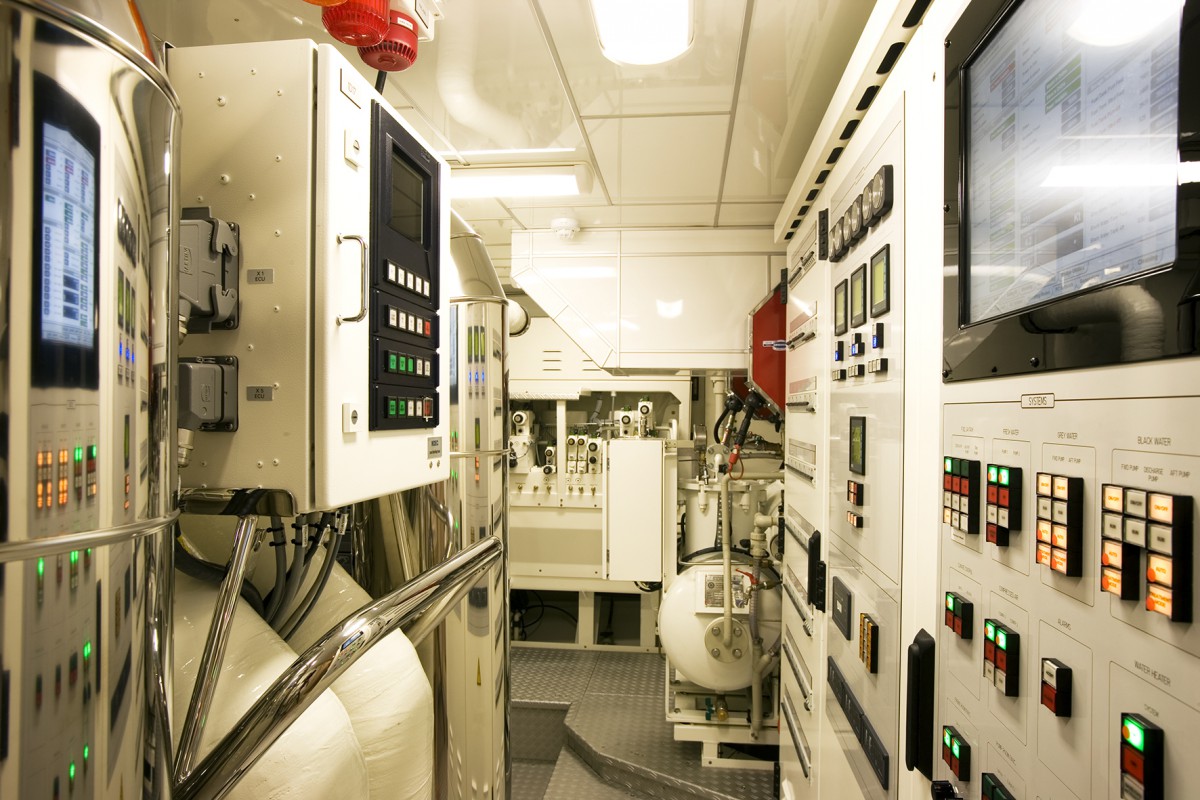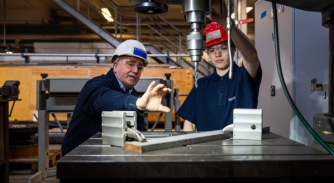Leading from below
Phil Richards, ex-engineer and technical recruiter at Lighthouse Careers, on the relevance of leadership training and development for engineers…

Image: © Stuart Pearce
These days, it seems everyone wants to be a leader. Walk through any airport and the bookshelves in the stores are filled with titles like Lead from the Front or The 10 Habits of Highly Effective Leaders. The self-help section is overflowing with leadership advice aimed at all kinds of professionals. In the world of yachting, this trend hasn’t gone unnoticed. There are leadership courses abound that are aimed at everyone from captains and chief officers to stewardesses and pursers. But conspicuous by their absence is the same kind of emphasis for engineers.
Being an ex-engineer myself, I’m not surprised. In my experience, leadership was something you fell into as you progressed through the ranks. There wasn’t any particular emphasis or desire for leadership development or skills, it was seen as something superfluous or something you either had or didn’t, and who even cared, as long as you could fix the engines?
It leaves the question: are yacht engineers behind the times? Are we missing something that the rest of the world has already figured out? Or is the rest of the world making too much of a fuss as usual while engineers tinker away in the engine room?
In many industries, leadership development is a fundamental aspect of career progression, particularly in structured environments like the military. Karl Santrian, a leadership development expert at BZ Maritime Leadership and former Royal Navy engineer, highlights this emphasis: “When you join the Royal Navy, you are trained to be a naval officer or rating first, with your specialisation coming second.” He notes that all candidates are assessed on their leadership abilities before starting, with officer training conducted collectively across specialisations. This ingrained focus on leadership from day one contrasts sharply with the commercial shipping and yachting sectors.
For engineers in the Royal Navy, leadership isn’t an option; it’s a fundamental requirement. The expectation is that they won’t just fix engines but will also manage teams and are a pivotal part of the command team operating the vessel. Engineers are required to take on additional responsibilities, such as engaging with external stakeholders, managing large numbers of crew or organising all aspects of a visit to an overseas port, all of which involve leadership skills.
Contrast this with the yachting world, where second or third engineers often remain isolated from leadership duties until they suddenly find themselves in charge. This difference in approach may go some way to explaining why leadership feels like an afterthought to many yacht engineers.
“Engineers are often seen as a distinct department on board, not as guest-facing as other roles. We’re more interested in mechanical systems than the human side of leadership.”
Paul Andrews, a highly experienced engineer who has a strong commercial background and is serving as chief on a 100-metre-plus yacht, brings a different perspective from the commercial side. “We’re a very male-dominated industry,” he says. “Many people hide behind bravado and don’t want to admit they need development.” For many engineers, leadership isn’t seen as essential. In fact, for older engineers, who have been working in the industry for decades, the idea of pursuing leadership training feels redundant. As Andrews puts it, “Some engineers feel so strongly that they've been around the block and have been doing this for years”, echoing the sentiment of many veteran engineers (and other professionals) who resist change.
Lars Beck, another experienced engineer from Denmark serving as chief on an 80-metre yacht, recalls: “We didn’t divide our training into separate sections, like sailing time and then theory; instead, we did all the theory at once, which included a bit of leadership training. It wasn’t a lot, but we covered some basics. For example, we discussed different cultures, like how Filipino culture differs from Danish culture. We also touched on conflict management and similar topics. It wasn’t a major part of the education, but it was enough to spark my interest.”
Tom Waters, who came up through the yachting ranks and now serves as chief on a 60-metre yacht, says: “There is a culture within yachting where engineers are seen as the ‘grumpy’ technical department, often separated from the rest of the crew in terms of leadership involvement. The background of other crew members, and who mentored them, plays a large role in shaping their views on leadership.”
So why don’t a lot of engineers really see leadership development as part of their job? Is the reluctance to embrace leadership rooted in a deeply embedded culture?
The technical focus of their work, coupled with the traditionally insular nature of the engine room, can mean that leadership is often seen as something that belongs to the captain or the senior deck officers. As Beck points out, engineers are rarely expected to interact with guests and are more interested in their technical responsibilities. “Engineers are often seen as a distinct department on board, not as guest-facing as other roles. We’re more interested in mechanical systems than the human side of leadership,” he explains.
“The old culture wars between the deck and the engine room, or the interior and the engine room, have created a divide that sometimes prevents engineers from stepping into leadership roles.”
This technical mindset has shaped the identity of engineers for generations. They are the mythical problem-solvers, the ones who, according to the old tales of lore, can get the main engine going again with a perfectly weighted tap from a hammer in just the right place. Leadership, on the other hand, is much more nuanced and focuses on human behaviour. Santrian describes this challenge well: “Leadership doesn’t work the same way as engineering. You can use a particular leadership technique on your second engineer, and it might work one day but fail the next because of something that happened the night before, a relationship break-up or whatever. So diagnosing machinery faults is complex and requires skill; however, consistently optimising human capability and performance presents an even greater level of sophistication and challenge.”
There’s also a generational element at play. Many engineers in yachting come from backgrounds where leadership wasn’t a core part of their training. They’ve been taught by ‘old-school’ figures who valued technical expertise above all else, and this has been passed down. As Waters notes, “The old culture wars between the deck and the engine room, or the interior and the engine room, have created a divide that sometimes prevents engineers from stepping into leadership roles.”
Andrews adds: “There is an old-fashioned, male-dominated bravado in the industry that makes engineers reluctant to pursue leadership training or admit they need development. Some feel they already know everything, especially the more seasoned engineers. Engineers sometimes don't prioritise leadership because their department has traditionally been more isolated from the rest of the crew, and leadership has not been expected of them in many cases.”
For engineers to step up as leaders, this mentality needs to change. While commonplace in the commercial world, there is an increasing recognition that chief engineers are as critical to the leadership structure as the captain or chief officer. This is perhaps a byproduct of the industry’s progress towards professionalism over the past two or three decades.
Santrian emphasises the importance of early leadership development: “Leadership isn’t something you learn overnight or buy attending a single course; it’s developed over time by practising skills and learning what works for you. At a junior level mistakes are generally less impactful and are more acceptable, so that’s the best time to practice and hone your leadership.” He also believes that the most common reason for senior engineers being removed from their roles is for leadership or human capability shortcomings, rather than their technical abilities. “Engineers would benefit from cultivating a leadership mindset as it will both enhance professional effectiveness and boost career prospects.”
Andrews believes conflict resolution training is particularly important, given the male-dominated and often ego-driven environment in engineering. He himself took an online course recently and found it eye-opening. “For some people, being a people person comes naturally. For others, it’s something they need to work on.”
So are engineers behind the times when it comes to leadership? The answer, in many cases, is yes.
One solution might lie in providing opportunities for engineers to take management or leadership courses – something they’re traditionally unlikely to pursue on their own, usually preferring to do something more technically focused, such as an engine manufacturer’s course. Beck suggests that captains have a role to play here, encouraging engineers to attend such courses. “Leadership is something you use every day,” he says, “and it’s quite important, especially for those who don’t naturally think that way.”
Santrian also suggests that engineers should look to enhance their Emotional Intelligence (EI) by increasing self-awareness. Research has shown that 90 per cent of top leaders have high EI, enabling them to recognise their strengths and growth areas, manage their own emotions and foster great relationships. Increasing self-awareness can be achieved using psychometric personality profiling, which provides an insight that is invaluable to a leader. A further step is fostering an environment that encourages engineers to practise leadership in informal ways. Even junior engineers, who may not have formal leadership responsibilities, can lead by example or help resolve conflicts within the crew. As Santrian ays, “the sooner they start practising these skills, the better they’ll become.”
So are engineers behind the times when it comes to leadership? The answer, in many cases, is yes. While the rest of the yachting world has embraced leadership development as a critical component of professional growth, engineers often remain isolated, focused on their technical expertise. But the tide is starting to turn. There is growing recognition that leadership is just as important in the engine room as it is on the bridge.
It’s no longer enough to tinker with tappets and keep the machinery running smoothly. Engineers need to step out of the engine room and into the leadership arena. Whether through formal training or informal practice, the next generation of yacht engineers, as in the commercial world, should be prepared to develop a holistic integration of technical expertise with strong leadership and interpersonal skills.
It’s not just about fixing engines or keeping up with the never-ending development of communications and AV/IT, it’s about additionally taking responsibility for the management and well-being of the entire crew, and that is often more complicated than anything else on board.
As an open-source platform we offer an industry-wide invitation to anyone and everyone in our sector to share their knowledge, experience and opinions. If you have an interesting and valuable contribution to make, and would like to join our growing community of guest columnists, share your ideas with us at newsdesk@thesuperyachtgroup.com.
Profile links
NEW: Sign up for SuperyachtNewsweek!
Get the latest weekly news, in-depth reports, intelligence, and strategic insights, delivered directly from The Superyacht Group's editors and market analysts.
Stay at the forefront of the superyacht industry with SuperyachtNewsweek
Click here to become part of The Superyacht Group community, and join us in our mission to make this industry accessible to all, and prosperous for the long-term. We are offering access to the superyacht industry’s most comprehensive and longstanding archive of business-critical information, as well as a comprehensive, real-time superyacht fleet database, for just £10 per month, because we are One Industry with One Mission. Sign up here.
Related news

Yacht crew issues expose commercial sector gaps
ISWAN's data highlights urgent need for industry reform and better support systems, so what can the industry do to help?
Crew
.jpg)
Beyond the basics
Is the quality of crew training keeping pace in an ever-evolving technological landscape?
Crew

It can be lonely up there ... Being a superyacht captain
PYA CEO Christophe Bourillon looks at the role of the captain, from navigating challenges to enhancing excellence.
Opinion

Who captains the captains?
What can senior crew learn from the leadership training acquired from a career in the British Royal Navy?
Crew

Building the next generation
Pendennis has been running an apprenticeship scheme for over 25 years, forming the bedrock of its experienced team of employees
Crew
Related news
Beyond the basics
1 year ago
Who captains the captains?
1 year ago
Building the next generation
1 year ago
NEW: Sign up for
SuperyachtNewsweek!
Get the latest weekly news, in-depth reports, intelligence, and strategic insights, delivered directly from The Superyacht Group's editors and market analysts.
Stay at the forefront of the superyacht industry with SuperyachtNewsweek



